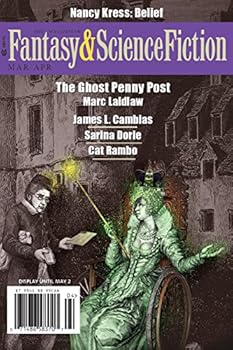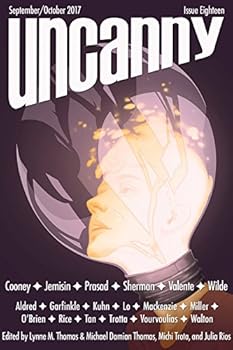Our weekly exploration of free and inexpensive short fiction available on the internet. As the jumping-off point for this week’s SHORTS column, we’re reviewing several of the stories mentioned in BookRiot’s January 4, 2018 column listing good places to read online short science fiction, which Marion Deeds noted in her January 10, 2018 WWWednesday column.

![]() “Red in Tooth and Cog” by Cat Rambo (2016, audio and text free at EscapePod, originally published in Fantasy & Science Fiction)
“Red in Tooth and Cog” by Cat Rambo (2016, audio and text free at EscapePod, originally published in Fantasy & Science Fiction)
Renee is eating lunch in the park one day when her smartphone is stolen by a small, swiftly moving robot. Since her phone case was decorated with some small opals that were a legacy from her godmother, Renee is determined to get her phone and case back. When the park’s robot caretaker shrugs her off (“That’s the problem with self-repairing, self-charging appliances—they go feral”), Renee begins haunting the park during her lunch breaks, looking for any sign of her phone case or the little robot that stole it.
Gradually Renee discovers a hidden ecosystem of tiny, wild robots in the park. She’s fascinated by it and by the various robots she encounters, giving them names and even “feeding” them bits of metal. But this doesn’t solve the problem of her Nana’s missing opals ―“That’s the sort of thing she’d cut you out of the will for” ― and her obsession is starting to affect her work. And then she finds out that the robots may be in danger …
The title comes from a famous line in Alfred Lord Tennyson’s poem In Memoriam A.H.H.: “Nature, red in tooth and claw,” evoking imagery of natural selection. Cat Rambo draws several lines of comparison between biological wildlife and ecosystems and the mechanical one developed by the feral robots. Rambo doesn’t soft-pedal the ferocity of either type of nature, but I still found this insightful and original story enormously appealing.
![]() “Later, Let’s Tear Up the Inner Sanctum” by A. Merc Rustad (2017, free at Lightspeed, $3.99 Kindle magazine issue)
“Later, Let’s Tear Up the Inner Sanctum” by A. Merc Rustad (2017, free at Lightspeed, $3.99 Kindle magazine issue)
Marvel Comics-style costumed superheroes, called the Excaliburs, have an ongoing war against supervillains in this tale. The story told through various media, such as email exchanges, online blog posts and news pieces, live interview broadcasts, and security camera recordings, in a “found footage” type of style. “Avabug” blogs about her hospital stay (she suffered radiation burns when superheroes were fighting above her school), but things get serious when girl superhero Ice Sickle gets into a battle with Sin-Master right in Avabug’s hospital room and someone winds up dead. Meanwhile, other entries show some of the interchanges and tensions between the superpowered humans … some of whom have hidden agendas.
The story has a non-linear structure; I read three or four sections before I realized that I had to pay really close attention to the dates at the top of each section. It can get confusing, but A. Merc Rustad tells a compelling story that examines some of the problems that go along with having superpowers. A romantic encounter and its aftermath struck me as a bit too pat, but otherwise I really enjoyed this story. Rustad has a sharp eye for the hypocrisy and prejudices in society.
![]() “The Greatest One-Star Restaurant in the Whole Quadrant” by Rachael K. Jones (2017, free at Lightspeed, $3.99 Kindle magazine issue)
“The Greatest One-Star Restaurant in the Whole Quadrant” by Rachael K. Jones (2017, free at Lightspeed, $3.99 Kindle magazine issue)
A group of cyborgs hijack a spaceship (while its human crew is on planetary leave), intending to travel back to a cyborg-controlled factory where they think they can find freedom from their servitude to humanity. While the cyborgs all have a mix of flesh and mechanical components, some of them look distinctly non-human (Captain is size and shape of a large fish tank), while others, like Friendly, appear outwardly human and can act as the interface with any humans they may run into on their trip.
It turns out that such interfacing is necessary: their hijacked ship had been a traveling food dispensary for other spaceships in the quadrant, and soon the cyborgs start getting meal demands from passing ships. But there’s no human food on the spaceship. The cyborgs don’t want to turn down the humans’ meal requests for fear of giving themselves away. What to do?
The answer is funny, gruesome, and ultimately disturbing, revealing something about the mentality that servitude creates. Rachael K. Jones has written a satirical story with attention to the small details that engage the reader, like the food reviews that start rolling in from the ships they serve. In a couple of unusual touches, all of the cyborgs are referred to as “she” in this story, and it’s the “meat” components of their bodies that they find gross and disgusting rather than their mechanical elements.
![]() “Henosis” by N.K. Jemisin (2017, free at Uncanny, $3.99 Kindle magazine issue)
“Henosis” by N.K. Jemisin (2017, free at Uncanny, $3.99 Kindle magazine issue)
Harkim is a well-known author who’s one of the finalists for an award to be given out that very night. He’s in a chauffeured limousine when he realizes that his driver is the wrong person. In fact, it’s a fan of his, who assures him that she’s kidnapping him for his own good.
With each section of this story, N.K. Jemisin jumps back and forth in time, gradually closing in on the key moment when we as readers realize what’s at stake, though the characters have been aware of it all along. The non-linear storytelling here seemed a bit like excessive gymnastics, though Jemisin helpfully includes chapter numbers to help the reader mentally order events. The ultimate reveal struck me as a little too weak of a concept to build an entire story around, though it’s told with Jemisin’s usual style and insight.
“Henosis” is a classical Greek word meaning “oneness”, “union” or “unity” with what is fundamental in reality, which concept gives the reader a little something extra to chew over in connection with the story’s underlying theme.

![]() “Two lists discovered folded in the wallet of space explorer Jorge Finnegan after the Reliant wreckage was recovered from Tau Ceti e” by Sylvia Spruck Wrigley (free at Daily Science Fiction)
“Two lists discovered folded in the wallet of space explorer Jorge Finnegan after the Reliant wreckage was recovered from Tau Ceti e” by Sylvia Spruck Wrigley (free at Daily Science Fiction)
The title is almost as long as the story itself! There’s a certain poignancy to the items in the two lists that comprise this very brief story, especially in connection with what the title reveals. But (like much flash fiction) there’s just not a lot of meat here, and ultimately it’s a forgettable exercise.
The other Daily Science Fiction piece listed in the BookRiot article, Cassandra Khaw’s “Saudade,” which is in more of a traditional story format, is almost as brief and, at least for me, equally unmemorable.






I picked my copy up last week and I can't wait to finish my current book and get started! I…
Gentlemen, I concur! (Forgive me for jumping into your convo)
The cover is amazing. I love how the graphic novel (and the review!) hewed close to the theme of "good…
I've thought about picking that one up. The artwork looks perfect.
I like the way you think, Bill. I found the second one particularly objectionable; the one with Khan. It was…